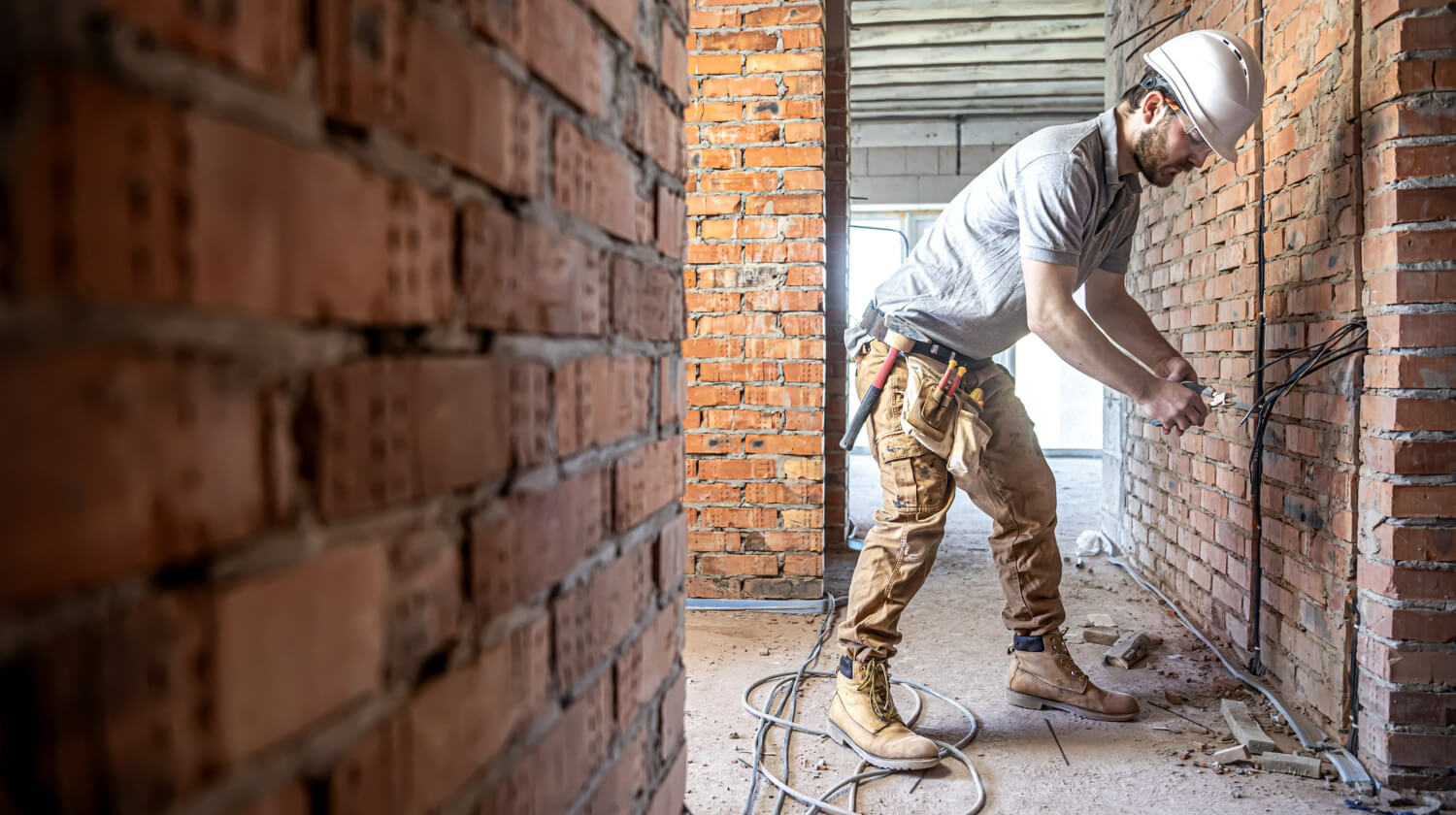Why Now is the Best Time to Start a Construction Industry Career
March 10th, 2023
5 min read
Choosing a career path can be very challenging. There are so many different options available, and you may not feel like you fit into the traditional college-bound route. The pressure to make the right decision can become overwhelming.
Have you considered a career in the construction industry? If you are looking for a fulfilling and rewarding career path that can be active, specialized, and innovative among many other benefits, the construction industry may be the perfect fit for you.
Here at Custom Built, we have over 15+ years of experience constructing beautifully remodeled spaces in Mid-Michigan homes. In addition, we love sharing our expertise about all aspects of the construction industry, including introducing young people to the many opportunities that abound within our trade!
In this article, you’ll be introduced to the many benefits of pursuing a gratifying career in the construction and skilled trades industry. Following are some of the many reasons you may want to consider this career path.
The cost of trade school or apprenticeship is much lower than the cost of earning a college degree.
It’s no secret that the cost of college has gone up tremendously in recent decades. For many people, rising education costs are a driving force for deciding to pursue careers that do not require a traditional 4-year degree.
Below are historical yearly tuition costs for different types of universities.
 https://educationdata.org/average-cost-of-college
https://educationdata.org/average-cost-of-college
Many great careers in the construction industry can be pursued with an alternative trade school or apprenticeship program. Compared to a 4-year university, these options provide a cost-effective and educationally streamlined approach to get you into your career faster.
A major benefit of trade schools is that tuition costs are much less than those of universities. Some 2-year public trade schools can provide you with the training you need for under $10,000 in total tuition fees.
Most apprenticeship programs will pay you while you learn the skills necessary to be an effective member of a construction team. The state of Michigan provides resources for registered apprenticeship programs to help find one that fits your interests.
You can avoid student loans and college debt.
If you ask anyone who has attended a university, they’ll likely tell you that they had to take out loans to graduate. Pursuing a career in construction often leaves you with no loans to pay off. If you do have to borrow money for your trades education, it will be considerably less than what you’d borrow to get a bachelor’s degree.
Student loans and college debt can be a major financial burden for those just entering the workforce. It can take many years to pay back the principal loan amount with the interest that has accrued.
The construction industry offers specialized opportunities and room to grow.
There is no shortage of different jobs you can do in the construction industry. You can learn to become a:
- Roofer
- Glazier
- Painter
- Plumber
- Drywaller
- Carpenter
- Electrician
- HVAC Specialist
- Flooring Specialist
- Brick/Siding Specialist
In addition, you could learn to operate the heavy machinery needed on job sites such as cranes, excavators, bulldozers, dump trucks, and front-end loaders.
There is a huge variety of jobs that can provide you with opportunities to grow and learn within the construction industry.
Construction training in the military transfers over to civilian careers.
Another avenue you may decide to take rather than attend college is joining the military. In recent years, the military has been a major proponent of providing soldiers with training that can carry over to civilian construction jobs after they leave the service.
In addition to the hands-on training received from the military, the GI bill provides veterans with assistance to pursue career education in a wide variety of fields including construction.
The same skill set can be used in different workplace settings.
Within the construction industry, you have the opportunity to choose the type of workplace you like working in best. Some common work sites that most jobs in the construction industry have applications for include:
- Residential construction
- Homes
- Condos
- Apartments
- Subdivisions
- Commercial construction
- Retail
- Offices
- High-rises
- Institutional construction
- Universities
- Public works
- Civil engineering
- Manufacturing construction
- Factories
- Foundries
- Maintenance
You may find that you enjoy working in one type of environment over another. With lots of opportunities in which to apply your skill set, you can choose a workplace setting you enjoy going to every day.
A national shortage of skilled trade workers means big job opportunities.
There is a lack of people applying for job openings in the skilled trades. This leaves you with a near-certain chance of finding employment after completing the necessary training.
The shortage of skilled workers is due to a variety of factors, including:
Priorities in education
A mainstream focus on college education has resulted in less emphasis on the importance of trades and technical skills education. This has led to a shortage of skilled workers in the trades.
Misunderstanding of the trades
There is a common misunderstanding that trades such as construction are low-skilled and that trades jobs are low-paying. This discourages people from pursuing training and careers in the trades, leading to a lack of skilled workers in these fields.
A career in the trades can require a similar level of skill development as an office career. Additionally, trades careers can be as or more fulfilling than other types of jobs, especially if you enjoy working with your hands and don’t want to be seated or working behind a computer screen all day.
While the workforce shortage makes it difficult for employers to find the right person for their job, it makes it easy for you to become a highly sought-after worker.
There is a low barrier to entry into construction work.
One of the great benefits of starting a career in the construction industry is the relatively low barrier to entry.
Unlike many other careers that require years of expensive education, you can begin many jobs in the construction industry without much difficulty.
Construction is a terrific opportunity if you want to ‘try out’ different jobs to find out what you like to do. A career in the trades could also help you avoid spending money on education that you may not put to use if you decide to change careers.
Construction jobs promote physical fitness.
Many construction jobs can provide great health benefits. Physical labor, such as heavy lifting, digging, and operating equipment, can help you stay in good physical condition, increase your strength and endurance, and improve your overall health.
Construction work can also involve spending time outdoors and getting plenty of fresh air and sunlight, which can have positive effects on mental health and well-being.
However, it is important to note that construction work can also be physically demanding and sometimes dangerous. Follow safety protocols and take necessary precautions to prevent injuries.
Construction jobs can help to prevent a sedentary lifestyle which can cause a range of health risks, including obesity, diabetes, heart disease, and other chronic conditions.
Construction jobs use the left & right sides of your brain every day.
One of the advantages of working in the skilled trades is the opportunity to use both sides of your brain regularly.
Jobs in the construction industry require workers to use creative problem-solving skills to troubleshoot issues on the fly, while also utilizing mathematics and other analytical skills to develop effective plans and measurements.
According to a study conducted by the National Library of Medicine, individuals who participate in varied cognitive activities are more likely to maintain a higher level of brain functioning.
Every day is different.
Unlike office jobs where you may work on a repetitive task for hours at a time, construction work involves being on your feet and using your hands to create something new and exciting.
Moreover, construction work allows for opportunities to learn and grow, as no two projects are the same. Each day can bring new challenges and opportunities to learn new skills or techniques, providing a sense of accomplishment and personal growth.
Next steps to pursue a career in the construction industry
For many people, deciding on a career path can be difficult and stressful. With an abundance of options available, it can feel daunting to make the right choice. This is especially true for those about to leave high school who have their whole life ahead of them.
The construction industry is always looking for people with a good work ethic, a willingness to learn, and a positive attitude. If this sounds like something you might be interested in, there are several ways to get more information about getting into the construction industry!
If you’re in high school, reach out to your guidance counselor for information about trade schools or apprenticeship programs. If you know people in the trades, see if you can shadow them for a day to learn what they do. Many skilled workers love showing the next generation what their job is all about!
The state of Michigan has apprenticeship programs and Lansing Community College offers accredited construction degrees and certificates. Additionally, the HBA of Michigan’s Skilled to Build Program educates children and students about the trades and construction industry and how to get into it.
To learn more about the remodeling sector of the construction industry, reach out to our team! We’d be happy to show you what we do to give you insight into our sector of the industry.
To learn more about the remodeling industry, read the following articles:
Michael brings over 2 decades of building and remodeling experience to his position as the Owner and Visionary of Custom Built. Michael’s passion to make an impact on the home building industry has led him to serve for over ten years at the local and state Home Builders Association, culminating as President of the HBA of Michigan in 2020.
Topics:


